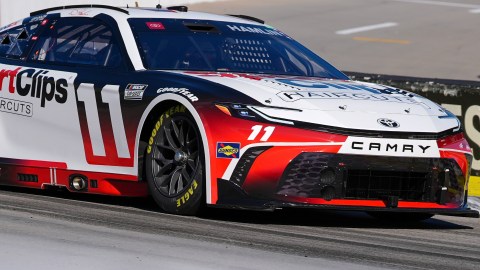Modern passenger cars come standard with a wide range of features and in-car technology that make owners’ lives more convenient. In the shipping industry, however, vehicle connectivity provide organizations with ways to bring in more money.
Transfix is doing just that.
The technology platform — which works with some of the companies that have ordered Tesla Semi trucks — provides brokerage services, linking shippers and truckers, as well as real-time tracking so firms can manage all their shipments. Its customers currently have access to the platform through mobile apps, though Drew McElroy, co-founder and CEO of Transfix, said the startup could eventually partner with manufacturers to integrate it into trucks’ infotainment systems.
“We have had conversations with OEMs about putting the platform directly in dash,” McElroy told NESN Fuel. “The value to us obviously would be supply liquidity, the value to them would be the opportunity to differentiate themselves to potential buyers as having a feature of the truck that can help drive efficient revenue to it.”
In addition to data for shippers, Transfix gives truckers valuable information about individual shipments via its driver app. Plus, drivers can report back about things such as fuel costs.
The app also has a routing feature that warns truckers about significant traffic delays they should avoid. McElroy said it doesn’t provide turn-by-turn directions, as Transfix determined they aren’t necessary.
“Most drivers are frankly pretty good at navigating on their own,” McElroy said. “We help them with navigation to where they’re specifically going on our behalf, but the process of moving from — for argument’s sake — L.A. to the east coast, most drivers know their preferred route. We provide them info about traffic, weather and stuff like that, but for the most part they’re doing their own route.”
Although Elon Musk’s proposed Tesla Network seemingly will provide similar functionality, but for passenger car owners, Transfix isn’t concerned about automakers launching proprietary systems that would compete with its platform. Citing the ongoing trend of manufacturer’s forming partnerships, rather than investing heavily in R&D, Transfix’s CEO suggests its unlikely that many companies will pursue that path.
Given that autonomous vehicles will eliminate the need for human operators, one might assume they represent a threat to non-traditional brokerage firms, such as Transfix. But McElroy actually claims the opposite is true.
“Autonomous trucks are incredible feats of engineering, but I liken them to hardware. They know how to drive, and how not to hit things, but the operation of a freight network, knowing where exactly things are and where they have to go, and things like that, is kind of outside the scope of manufacturing an autonomous truck.
“So we view the growth of autonomous vehicles very synergistic with our platform.”



